Exploring the Smartest Pet Birds and Their Unique Traits
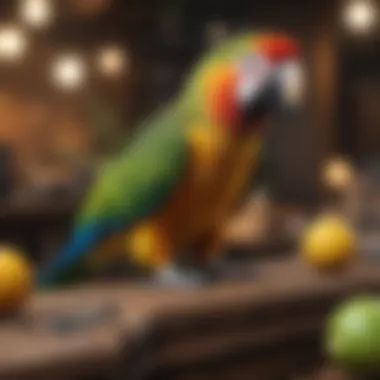
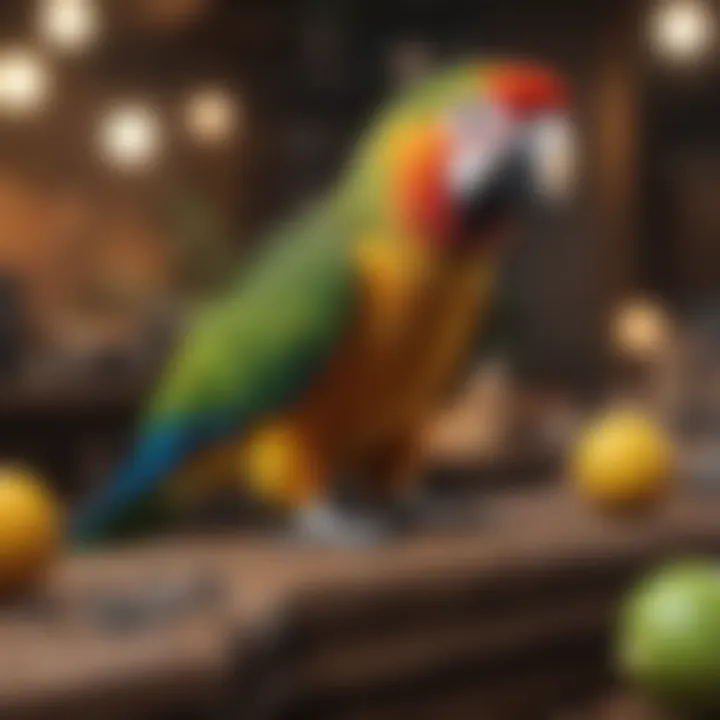
Intro
Understanding the intelligence of pet birds is a captivating journey into a world where sophisticated behaviors and social interactions unfold daily. Bird enthusiasts of all levels appreciate the unique qualities that companion birds bring to their lives. This article serves as a comprehensive resource for exploring the cognitive capabilities, enriching environments, and thoughtful care approaches necessary for nurturing these remarkable creatures. By delving into various bird species known for their intelligence, it draws attention to essential aspects of being a responsible bird owner.
Care Tips
Proper care is critical in providing a healthy and stimulating environment for your pet bird. Here, we outline several vital aspects of care meticulously tailored to their specific needs.
Daily Care Routines
Establishing a steady daily routine benefits both the bird and the owner. Birds thrive on consistency. Regular feeding times, play sessions, and social interactions should be part of this schedule. Ensure that your bird has ample time outside of its cage to explore and engage in activities that spark its curiosity.
Cage Setup and Maintenance
The cage should be sized appropriately for the species you own, giving ample space to move around. Include the appropriate perches, toys, and food/water dishes in an easily accessible layout. Regular maintenance is crucial for your bird’s well-being. Clean the cage and replace bedding frequently to avoid health problems.
Hygiene and Cleaning Practices
A clean environment minimizes the risk of diseases. Use bird-safe detergents for cleaning. Focus on watering dishes and any surface the bird frequently interacts with. Cleaning has to be done regularly, at least once a week for a solid habitat setup.
Seasonal Care Adjustments
The seasons can impact your bird's health. In warmer months, consider lessening the amount of food and ensuring the cage is well-ventilated. In colder months, ensure warmth with appropriate insulation and light sources. Adjusting care routines accordingly helps maintain your bird’s health and comfort throughout the year.
Behavioral Insights
Understanding and interpreting a bird’s body language is essential in fostering a strong bond between the pet and its owner. Behavioral insight enhances communication and ensures a pleasant living environment.
Understanding Bird Body Language
A bird's posture and feather position can imply its mood. For instance, puffed-up feathers may indicate relaxation or illness, while a fluffed head may signify agitation. Spending time observing these cues deepens your ability to meet your bird’s emotional needs.
Common Behavioral Issues and Solutions
Birds can display problematic behaviors due to stress or lack of stimulation. Common issues may include excessive screaming or feather plucking. Understanding these root causes allows for proper interventions that promote calmness and balance in their lives. Consulting avian specialists for severe cases is essential.
Positive Reinforcement Techniques
Training can strengthen the bond with your pet bird. Use treats or praises when your bird exhibits desired behaviors. Positive reinforcement encourages learning without instilling fear, fostering trust.
Social Interaction Needs
Birds are social creatures. Ensuring regular interaction—both with human companions and, where appropriate, with other birds—is vital for healthy psychological well-being. Be mindful to provide them with social outlets to enjoy, especially if they are kept alone.
Nutrition Guides
An appropriate diet underlines any bird's physical well-being and intelligence. Educating yourself on your bird's nutritional needs is paramount in ensuring a long and healthy life for your pet.
Essential Diet Components
A well-rounded diet consists of pellets, seeds, fresh fruits, and vegetables. Each species has a unique set of dietary requirements; consult specific feeding guidelines for your bird type.
Safe and Toxic Foods
Certain foods can be toxic to birds. Foods like chocolate, caffeine, avocados, and onions should be strictly avoided. Familiarizing oneself with safe options promotes long-term health.
Supplements and Treats
Supplementing with vitamins can enhance nutrition, particularly in birds with restricted diets. Treats such as nuts and seeds are acceptable but should be provided sparingly. Balance is key.
Feeding Strategies for Different Species
Different species require varying approaches to feeding. Some birds prefer smaller pieces, while others need fruits and veggies mashed. Being observant of preferences promotes better eating habits.
Wellness and Health
Maintaining a vigilant eye on your pet's health is equally important. A bird's appearance ultimately reflects its overall status.
Routine Health Checkups
Just like humans, birds require routine health checkups. Consulting an avian vet annually can facilitate early detection of potential concerns.
Identifying Symptoms of Illness
Learn to identify indicators of illness. Signs such as lethargy, poor appetite, or changes in droppings can reveal health issues. Recognizing symptoms allows swift action should any concerns arise.
Preventative Care and Vaccinations
Regular vaccinations are protective measures for your pet. Preventative care minimizes risk. Consult an avian vet about necessary vaccinations, regardless of whether the bird shows signs of discomfort.
Mental and Emotional Well-being
Encourage exploration and social activity to promote emotional health. Providing stimulating environments aids mental well-being, fostering happiness and sociability.
Enriching Activities
Part of owning a smart pet bird is emphasizing interactive and engaging activities. Keeping their mind sharp will enhance their quality of life.
Toys and Playtime Ideas
Providing an assortment of toys can satisfy foraging instincts. Rotate toys regularly to maintain interest and temptation. Hanging toys and interactive puzzles encourage physical and mental exercise.
Training and Tricks

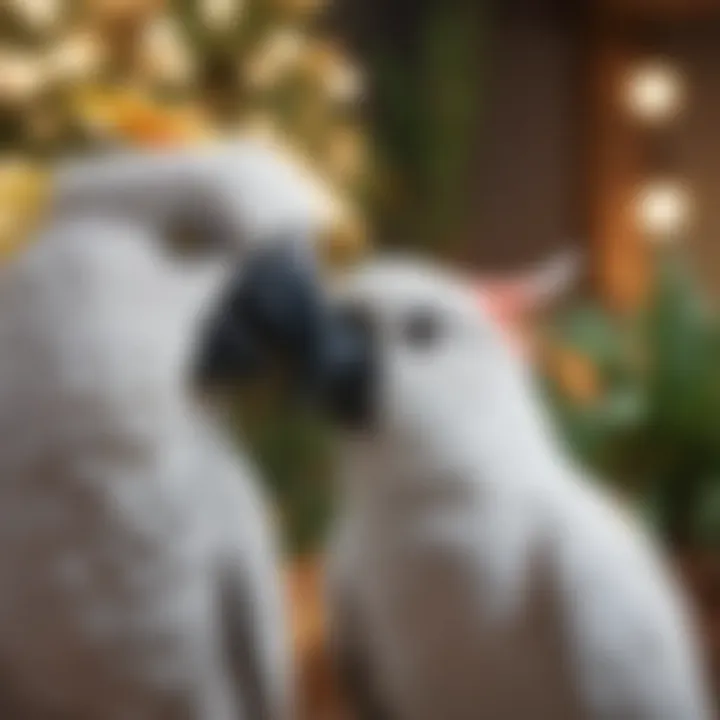
Dedicated training sessions can stimulate your bird's mind. Utilizing teaching techniques to help birds learn tricks enables social engagement and strengthens bonds.
Outdoor Activities and Interaction
When safely supervised, allowing interaction outside with direct supervision can stimulate birds positively. This may enrich their experience while diversifying routines.
DIY Projects for Mental Stimulation
Consider making homemade foraging toys from paper or wood. Engaging a bird's creative side assists in staying motivated and promotes a healthy lifestyle. There are endless possibilities available.
The intelligence of pet birds combined with conscientious care fosters enduring relationships. By comprehending their needs and ensuring stimulation, owners elevate the bond shared.
Foreword to Intelligent Pet Birds
Understanding intelligent pet birds goes beyond mere fascination. It involves recognizing the unique cognitive capabilities and social behaviors that distinguish them within the realm of household pets. Intelligence in birds is often a nuanced measure that captures various abilities—problem-solving, social awareness, and communication skills are just a few key elements.
The discussion around intelligent pet birds highlights their advanced social structures and interaction methods, often revealing a depth of communication that can rival that found in mammals. As potential owners or current bird parents, having this knowledge is vital. It informs not only your selection of species but also has a profound impact on how best to cater to your avian companion's emotional and mental needs.
Considering an intelligent bird as a pet means committing to significant responsibilities. Unique attributes such as vocal mimicry, curiosity, and problem-solving strategies demand adaptations in your caregiving approach. Therefore, the benefits of educating oneself about these intelligent species are immense. Both the owner and bird can enjoy a mutually rewarding relationship when the intelligence of the species is understood correctly.
With the interaction between cognitive abilities and environment in mind, this article focuses on providing you with a comprehensive guide to support the health and happiness of intelligent bird species. Whether you have a background with birds or you're an aspiring guardian, this exploration into intelligent pet birds is intended to both inform and enhance your understanding.
“It is not enough to fully provide for the basic needs; one must also foster an environment wherein the natural intelligence of pet birds can thrive.”
The specifics in care, training, and enrichment that will be discussed in subsequent sections should clarify how best to cater to the nuanced needs of these remarkable creatures, ensuring a harmonious coexistence for years to come.
Defining Intelligence in Birds
Understanding what constitutes intelligence in birds is crucial when examining the species that stand out as remarkable companions. Definitions of intelligence among birds can vary based on cognitive abilities and social dynamics. This comprehensively captures how these traits function within their behaviors in both wild and domestic scenarios.
Defining avian intelligence is not merely about measuring their problem-solving skills or verbal mimicry. It includes assessing their social interactions and emotional bonds with their environments and humans. This exploration benefits owners by revealing the complexities of avian behavior that enhance relational depth between humans and their feathered companions.
Cognitive Abilities
Cognitive abilities in birds refer to their brainpower, shaping their learning, memory, and understanding of their surroundings. Intelligence translates differently across bird species due to differences in brain structure and size.
Research shows that larger birds, specifically those with more neurons in their forebrain, such as the African Grey Parrot, often excel at reasoning and understanding. Problem-solving tasks can reveal these features. Birds often employ techniques such as causal learning, learning from observing, and even remembering individual human faces.
Some key areas of cognitive abilities include:
- Problem-Solving Skills: Birds demonstrate their capacity to engage in complex tasks, often overcoming barriers to reach food. This displays not only their cognitive prowess but also their persistence.
- Spatial Memory: Birds like Clark's nutcracker are exceptionally equipped for spatial memory tasks, allowing them to retrieve hidden food items months after they were stored. This skill illustrates how intelligence also supports basic survival skills in the wild.
- Tool Use: Certain bird species have gained notoriety for their impressive ability to use tools. For example, New Caledonian crows fashion sticks and leaves to extract insects from bark or holes. Such behavior reflects advanced planning and innovation.
Social Intelligence
Social intelligence encompasses a bird's ability to navigate social structures, let it be within their own species or in interactions with humans. This type of intelligence shapes the relationships birds form with their owners and among flock members.
Surprisingly, many pet owners might notice their birds showcasing emotions or creating hierarchies amongst themselves and even within their human families. For instance, African grey parrots can exhibit behaviors indicative of empathy, recognizing the distress of a companion.
Noteworthy aspects of social intelligence are:
- Communication Skills: Parrots are famous for their vocal mimicry skills, mimicking sounds and phrases they are exposed to in their environments. Their ability to ‘speak' suggests an understanding of context related to social communications.
- Emotional Expression: Many pet birds show signs of happiness, frustration, or even jealousy. Understanding these emotional cues can enhance the bond between humans and birds.
- Learning from Others: Avian species also showcase the capacity for social learning. A bird might learn how to open a cage or mimic certain phrases by observing their flock mates or human caregivers.
These highlights in defining intelligence illustrate that understanding bird intelligence significantly impacts our interactions. Recognizing their cognitive and social capabilities lays the groundwork for effective care, training, and enriched living environments.
Top Intelligent Bird Species
Understanding the Top Intelligent Bird Species is crucial when exploring pet birds. Choosing the right species can heavily impact how well they adapt and thrive in their human environment. Each bird species comes with unique traits, behavioral traits, and cognitive skills, making them stand out among others.
The intelligence of a pet bird affects not just its ability to learn commands but also its overall health, happiness, and well-being. Intelligent species can form stronger bonds with their owners and can engage in more complex interactions. By considering the specific needs and capabilities of various species, owners can provide more suitable environments, making the partnership fulfilling and enriching for both the bird and its human companion.
African Grey Parrot
Known for its exceptional intelligence, the African Grey Parrot is often regarded as one of the smartest birds in the pet trade. These parrots have remarkable vocal abilities, including mimicking human speech with clarity and context. Their cognitive skills allow them to understand concepts such as size and quantity, enabling them to perform complex tasks and solve problems effectively.
African Greys thrive on mental stimulation, and they require consistent interaction and training to remain engaged. Their social nature makes them quite affectionate, but they can also develop strong attachments to their owners. It’s essential for potential owners to understand that with this intelligence comes the need for sufficient enrichment activities.
Cockatoo
The Cockatoo is another highly intelligent bird that captivates pet owners with its playful demeanor and social proclivities. These birds are known for their remarkable affectionate nature, forming deep bonds with their human companions. Cockatoos are quick learners, absorbing new commands and tricks rapidly. Their vocalizations are another showcase of their intelligence, with many species developing an extensive repertoire of sounds.
However, because they are extremely social, Cockatoos can experience separation anxiety if left alone for long periods. Therefore, it is essential for owners to ensure regular interaction and companionship. A stimulating environment tailored to their needs is key to their happiness and mental wellbeing.
Macaw
The Macaw, with its striking colors and large size, is also one of the educated birds within the pet avian community. Macaws are known for their intelligence levels, often ranking alongside the African Grey and Cockatoo. They can learn an array of words and phrases, providing a fascinating dynamic between bird and owner.
Due to their robust emotional and social needs, Macaws require considerable commitment from their owners. Engaging them in regular training sessions and playful activities not only helps strengthen their bond but also prevents behavioral issues associated with boredom. Thus, understanding and catering to their intellectual needs is critical for anyone considering bringing a Macaw into their home.
Budgerigar
The Budgerigar, often simply called a Budgie, might be smaller than the previous birds, but do not underestimate its intellect. Budgies can learn to mimic speech and perform simple tricks, often surprising their owners with their aptitude. Their social nature means they thrive in interactive environments filled with companionship.
Budgerigars are also less demanding in terms of space compared to larger birds. However, they do need mental stimulation from toys and activities to maintain their mental health. Properly understood and cared for, a Budgerigar can be not only a delightful companion but also an intelligent addition to any household.
Assessing Avian Intelligence
Understanding and evaluating avian intelligence is vital in providing informed care and support for smart pet birds. The need to assess their intelligence stems from various dimensions that illuminate their cognitive faculties, revealing complex behaviors and learned skills.
For potential owners and breeders, grasping the various aspects of avian intelligence allows for a better alignment of environmental needs. Recognizing these needs ensures that birds are not just housed, but are actively engaged in mental stimulation and social activities. Assessing intelligence serves beneficial purposes:
- Enhances Owner-Companion Bonding: Knowing how to interact with a smart bird establishes trust and deepens the relationship.
- Improves Training Efficiency: Insights into a bird's problem-solving skills can streamline the training process.
- Informs Enrichment Activities: By understanding their capabilities, tailored enrichment strategies can keep birds thriving emotionally and intellectually.
Whether considering a new bird or nurturing a smart companion, awareness of avian intelligence correlates heavily with not only the happiness of the bird but also the satisfaction of the owner.
Problem-Solving Skills
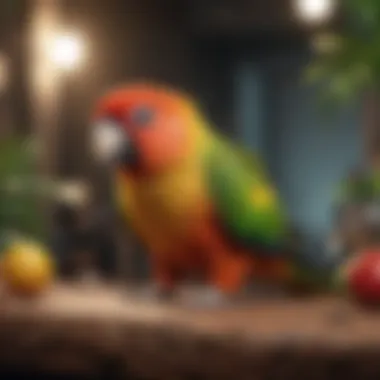
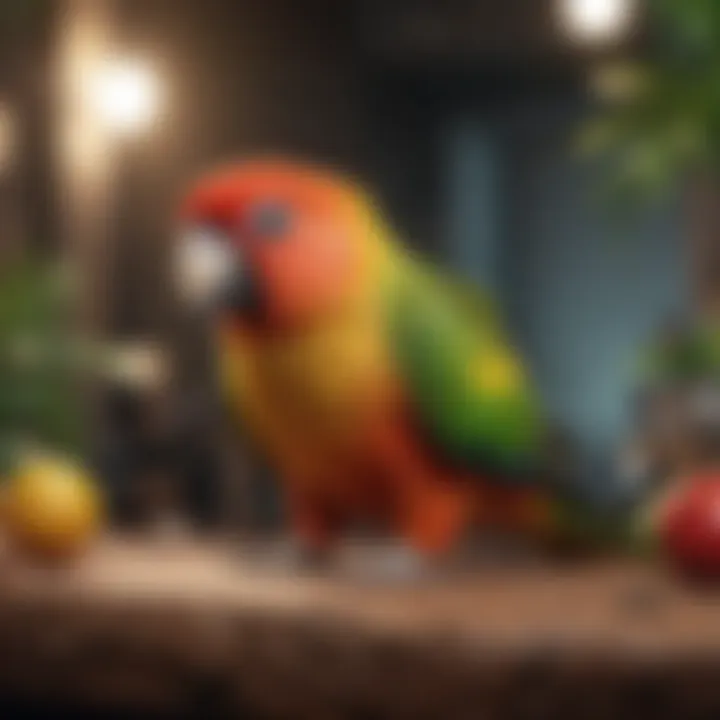
Problem-solving skills stand at the core of avian intelligence assessment. Pet birds exhibit remarkable abilities to tackle challenges, often using tools and demonstrating creative solutions to gain access to food or escape enclosures.
Specifically, species like the African Grey Parrot showcase extraordinary capabilities when presented with puzzles. They explore different angles, engage in trial-and-error methods, and persistently attempt various actions until a successful outcome is achieved. These skills not only speak to their cognitive ability but also reflect their need for engagement—a crucial element that nurtures their well-being.
Communication Techniques
Communication is yet another factor in gauging how smart a bird can be. Birds utilize vocalizations and body language effectively to converse with their owners and other birds. Parrots, for instance, are well known for mimicking human sounds and phrases, illustrating their capacity for both recognition and reproduction. Through social interaction, they understand nuances of when to use specific calls.
Birds can bond with their humans via verbal communication and nuanced gestures. Scripts do evolve based on interaction level, leading to a blend of learned behaviors that articulate their needs and responses. Proper recognition of these signals informs an owner about the bird’s emotional state and preferences.
Social Learning
The dimension of social learning indicates how smart birds scaffold their cognitive development through interaction with peers and humans. Intelligent species possess the capability to observe behaviors and cues from their surroundings, adapting and mimicking results found from these observations. It is crucial for owners to realize that encouraging collabourative settings will foster growth.
Understanding the social structure within which birds learn allows for the encouragement of specific skills through shared activities. Location-based and breed-specific tendencies will also guide how individuals or groups learn. This learning process contributes substantially to a bird’s ability to imagine and realize solutions beyond mere instinctive actions.
The way smart birds learn from their social environments indicates they possess subtle abstract learning—a hallmark of intellect.
The intelligence in pet birds is multi-faceted, encompassing their problem-solving skills, communication capabilities, and social learning. Assessing these areas is not just informative, but imperative for anyone looking to fully connect and engage with their intelligent avian friends.
Behavioral Traits of Smart Birds
The behavioral traits of smart birds are crucial when considering the pet's well-being and the owner's experience. Unlike more typical pet animals, the most intelligent bird species exhibit complex behavioral patterns that reflect their high cognitive abilities. Understanding these traits is essential for owners seeking to enhance their bonds with these feathered companions.
Playfulness
Playfulness in birds is a fundamental aspect that outlines their capability to engage in enjoyable activities. Birds that display playful traits are often more adaptable and can thrive better in their environments. These behaviors may include playful vocalizations, manipulating objects, or engaging in games with their caretakers. The importance of play lies in its behavioral benefits. Play acts as a platform for birds to learn new skills, explore their surroundings, and develop healthier social interactions. Moreover, introducing varieties of constructive play, such as providing toys or creating obstacle courses, enriches their environment, keeping boredom at bay and enhancing mental stimulation. Engage with your birds daily, as an energetic and attentive approach fosters strong play sessions and maintains their well-being.
Curiosity
Curiosity serves as a vital characteristic that highlights a bird's desire to explore and learn. This trait opens the door to discovery, making environments stimulating for ciurious birds. Intelligent species are known to seek new experiences and investigate assorted objects. By nurturing this curiosity, owners can create dynamic settings that constantly engage their pets. Various enriching activities can satisfy their inquisitive nature. For instance, introducing different items and changing their placements can keep birds entertained. Explore new toys regularly and offer occasional foraging opportunities. The desire to investigate not only benefits their mental enrichment but also prompts owners to engage more deeply with their companions.
Mimicry and Vocalization
Mimicry and vocalization are two distinct behavioral patterns where smart birds excel. Many intelligent species have the remarkable ability to imitate sounds and words, showcasing their intellectual flexibility. This skill serves several purposes, from communication to social bonding. The act of mimicking can improve the social bonds between the owner and the bird, leading to a strengthening of the relationship.
Incorporating training sessions can help foster and refine mimicry skills. It is a fundamental trait allowing birds to convey emotions or responses to their environment creatively. These unique vocal patterns exhibit a profound understanding of their surroundings, making them fascinating companions. Nurturing this capacity can yield fantastic results, prompting interactions that mirror the complex linguistic skills you might find in other animals.
Caution should be exercised to ensure that excessive vocalization does not negatively impact household tranquility.
Nurturing Intelligent Birds
Nurturing intelligent birds requires a comprehensive understanding of their specific needs and behaviors. This section serves to enlighten pet bird owners about how best to provide a suitable home. Intelligent bird species, like African Grey parrots and Macaws, thrive in environments where they are stimulated mentally and physically. Understanding elements like their habitat, social needs, and mental engagement enrich their overall well-being.
Ideal Environment
Creating the right environment is crucial for the nurturing of intelligent birds. Birds need spacious cages that allow movement. Their living spaces should include elements such as perches, toys, and platforms where they can climb and explore. Light is essential too; a well-lit area enables natural behaviors.
Here are some key points to consider:
- Cage Size: A larger cage facilitates exercise and exploration.
- Toys: Innovative toys that challenge their intellect will keep them motivated and engaged.
- Safety: Use non-toxic materials and avoid anything that could cause harm.
Every detail matters; in this way, intelligent parrots will remain healthy, and their natural curiosity will be supported.
Social Interaction
Social interaction cannot be overstated when caring for smart birds. Many species are highly social and can develop strong bonds with their owners and other birds. Providing opportunities for interaction is key for their mental health.
Consider these aspects:
- Daily Engagement: Spend time talking or singing with your bird. It reinforces their social skills and keeps them stimulated.
- Bird Companionship: In some instances, other birds can serve as good companions.
- Variety of Interaction: Changing up the routine and activities helps reduce boredom and promotes positive social behaviors.
By fostering these social connections, owners will elevate their bird's quality of life significantly.
Mental Stimulation Activities
Bright minds require engagement. Implementing varied activities each day ensures that birds do not fall into monotonous routines. Activities should stimulate both mental and physical abilities.
Some effective methods include:
- Interactive Toys: Puzzles or toys that require manipulation help keep their intellect sharp.
- Training Sessions: Commence with basic commands and progressively advance to tricks that pique their interest.
- Exploration Time: Letting birds outside their cages safely means they can discover their surroundings.
Training Techniques for Intelligent Birds
Training is crucial for cultivating the skills and behaviors of intelligent pet birds. It enhances their cognitive functions and strengthens the bond between the bird and owner. Understanding how to train these creatures effectively can lead to improved communication and overall well-being.
Positive Reinforcement
Positive reinforcement is one of the most effective training methods. This technique relies on rewarding desired behaviors to encourage repetition. For instance, if a bird performs a trick successfully, offering a treat or verbal praise boosts its motivation to repeat the action. Using this method creates a favorable learning environment that can enhance the bird's confidence and enthusiasm during training.
- Benefits:
- Increases the retention of learned behaviors
- Reduces anxiety associated with training
- Establishes trust between the bird and owner
Managing a consistent schedule when training birds with positive reinforcement is key. Regular practice sessions, ideally short but frequent, can significantly enhance learning efficacy.
Basic Commands
Teaching basic commands is an essential step in bird training. Simple directives, such as come, step up, or no, help create a foundational understanding between the bird and the owner. Completing these initial lessons sets the stage for more advanced tricks, aiding in better communication.
Steps for Effective Basic Command Training:
- Choose a Command: Clear and distinct words are crucial. Generally, one or two-syllable commands work best.
- Use Clear Gestures: Along with words, incorporate hand signals or physical objects that reinforce verbal communication.
- Reward Success: Every time the bird successfully obeys a command, offer a treat or praise.

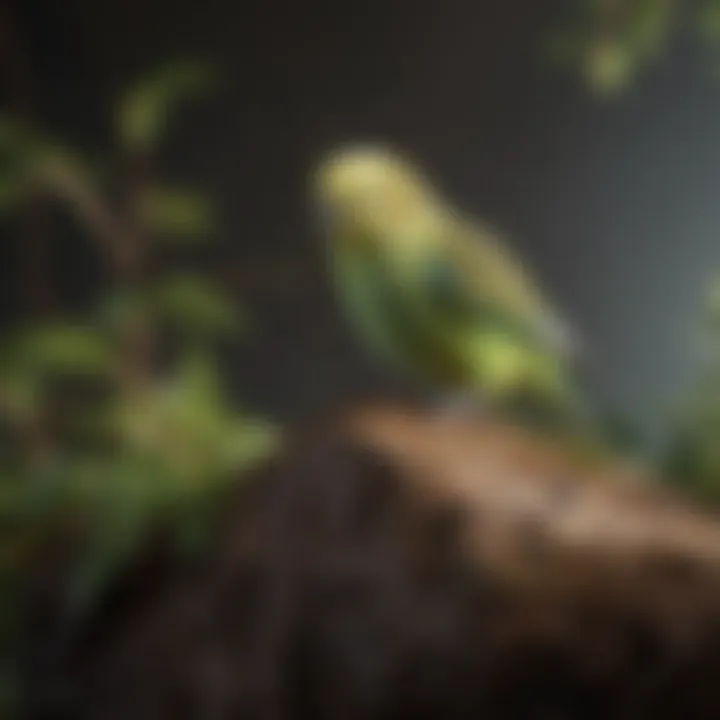
Gradually increase difficulty with learned commands. This will help maintain the bird's interest and challenge its learning capabilities.
Advanced Tricks
Once a bird masters basic commands, owners can introduce advanced tricks. These tasks may include playing dead, fake flying, or more complex routines. Training advanced tricks involves patience and creativity, often requiring the application of previously learned commands in novel ways.
- Key Considerations for Advanced Training:
- Gradual Progression: Start with simpler tricks that lead into more complex moves.
- Lengthy Practice: As advanced tricks often take longer to learn, consistency is important.
- Mix It Up: Incorporate different settings to keep training engaging, changing the environment and materials used.
The challenge of teaching advanced tricks not only boosts the bird's cognitive functions but also solidifies the relationship with its owner. This continuous engagement forms a reciprocal bond that benefits both.
A well-trained bird enhances not only its own life but also that of its owner, building empathy and communication skills that are invaluable.
By empowering birds through training, caregivers will be able to nurture their natural abilities, create enriching environments, and foster a more fulfilling companionship. As a mutual growth experience, training can turn the ownership of an intelligent bird into both a joy and a significant journey towards mutual understanding.
The Relationship Between Intelligence and Lifespan
The relationship between intelligence and lifespan in birds is an intriguing topic that draws attention for a number of reasons. Understanding how intelligence correlates with life expectancy can provide hope and guidelines for pet owners. It highlights the significance of cognitive abilities along with their effects on health. Focusing on these parameters can lead to better pethood experiences, optimizing care, and improving the well-being of these birds.
Life Expectancy in Intelligent Birds
Birds known for their intelligence often exhibit longer life spans compared to their less cognitively endowed peers. This trend can be seen broadly across various species, particularly the African Grey Parrot, the Cockatoo, and Macaws. These species can live significantly longer when compared to typical pet birds. For instance, African Grey Parrots can live for up to 50 years or more.
Factors contributing to increased lifespan in intelligent birds include:
- Social Relationships: Intelligent birds tend to form strong bonds. Interacting positively with their environment and caretakers aids their emotional health.
- Adaptability: Their cognitive talents allow them to adapt successfully to changes. Good adaptation skills typically reduce stress and improve survival.
- Engagement: Activities requiring thought and physical engagement are common with intelligent birds. These challenges relax their minds and make life worthwhile.
Such aspects do not only contribute to longer life but undeniably promote a fulfilling and vibrant life.
Health Considerations
Health is another essential part of longevity for intelligent birds. Many times, the cleverer birds also encounter unique health challenges. Visualizing these factors discusses the importance of dedicated veterinary care and preventive measures. Intelligent birds, particularly those in urban settings, may face:
- Nutritional Needs: Their diet might require careful formulation to meet energy needs. Without proper nutrition, they may suffer from diseases that lessen their quality of life.
- Boredom and Stress: Stagnation in environments can lead to behavioral issues. Stressful living conditions can harm their health, causing problems like feather plucking and obesity.
- Regular Health Checks: Consistent check-ups with avian vets are crucial. Professionals can help manage maladies specific to intelligent species owing to their unique behaviors.
Ensuring both neurological engagement and physical well-being allows pet owners to maximize their companion’s life experience.
This insight expands beyond merely keeping intelligent birds; it connects closely with longevity strategies implemented by caretakers and ensures informed pet ownership.
Challenges of Keeping Smart Birds
Keeping intelligent pet birds can be a rewarding experience, but it also presents its own set of challenges. Understanding these challenges is crucial for potential owners. Intelligent birds require unique forms of care and enrichment that go beyond typical pet care practices. The emotional and mental needs of these birds are central to their well-being and behavior, making it important for owners to be informed about potential issues.
Behavioral Issues
Behavioral quirks are a common part of caring for smart birds. While these birds are often engaging and fun, they can also develop problematic behaviors if their needs aren’t met. These challenges stem mostly from boredom or lack of social interaction. Birds such as the African Grey Parrot and the Macaw are known for their high intelligence but can become mischievous if insufficiently stimulated.
Some common behavioral issues include:
- Excessive screaming: Intelligent birds may scream to get attention, especially when they feel ignored.
- Feather plucking: This may indicate stress or health issues, a more common problem among smart birds.
- Aggression toward handler: Birds needing stimulation might become aggressive, biting or lunging at owners or surroundings.
- Destructive behavior: Chewing and destruction occur if the bird has inadequate toys and challenges to engage with.
Preventing these issues requires commitment and proactive strategies. Regular enrichment activities are essential to lessen these tendencies while meeting their physical and mental stimulation needs.
Mental Health and Enrichment
The mental health of intelligent birds is paramount. Birds thrive on mental engagements, and a lack of interaction can lead to poor mental health. Enriching their environment is crucial for their overall well-being. Smart birds like Cockatoos and Budgerigars benefit significantly from stimulation that encourages their curiosity and intelligence.
To provide adequate mental enrichment, consider:
- Interactive toys: These can challenge their problem-solving skills and keep them entertained.
- Learning opportunities: Teach new words, ideas, or tricks. This caters to their cognitive strengths and natural tendencies to mimic.
- Socialization needs: Regular interaction with their owners or other birds prevents loneliness and encourages happier dispositions.
- Safe exploring: Allow them time outside their cages in safe spaces to explore their surroundings.
Nurturing their mental health effectively minimizes chances of developing adverse behaviors. A well-balanced routine that balances social time, learning, and play is essential for keeping them happy and healthy.
“Just as humans require engagement and affirmation for their psychological well-being, intelligent birds demand a similar regard for their mental health.”
By comprehensively addressing these challenges, potential bird owners can cultivate a nurturing and tackling a lasting relationship with their clever companions.
The Future of Avian Companionship
As the world changes, so do the dynamics of pet ownership. The future of avian companionship holds promise for both bird owners and the birds themselves. More individuals are beginning to realize that keeping a bird involves not just a pet but a profound relationship. Intelligence and social needs of birds demand a higher level of understanding from their owners.
Rising Popularity of Intelligent Birds
Intelligent birds are becoming increasingly popular as pets among various demographics. This trend can be attributed to several factors. First, people's desire for companionship is leading them to reports and conversations about bird intelligence. Unlike traditional pets, birds can engage with owners on a different level. Bird species like the African Grey Parrot and the Cockatoo exhibit notable cognitive skills, expanding the idea of what a pet can be.
The unique abilities of these birds, such as their capacity for mimicry and problem-solving, attract those looking for an interactive experience. Owners find joy in teaching their birds tricks, playing games, and even engaging in meaningful conversations.
Additionally, social media has magnified the fascination with avian companionship. Owners share videos and stories that showcase the vivid personalities of their birds, emphasizing their smart behaviors. As these engaging interactions become public, more people are incentivized to consider intelligent birds for companionship.
Advancements in Avian Care
As the understanding of bird intelligence grows, so too does the scope of avian care. Modern insights reveal that intelligent birds require rich environmental stimulation, social interaction, and mental enrichment. This demand calls for new advancements in care methodologies tailored specifically for them.
Products that provide sensory stimulation, such as challenging puzzles or interactive toys, are designed to keep them mentally engaged. Moreover, specialized diets are developed to cater to their unique physiologcal needs, ensuring a balanced nutrition as essential to brain function and overall health.
Veterinary science has also advanced in major ways. Available resources such as behaviorists and avian specialists can now aid owners in issues related to behavioral management and health concerns specific to intelligent birds. Accessing accurate information through scientific publications and expert forums is simpler than ever. Additionally, the importance of social bonding is more recognized in treatment methods. Making not just functional but meaningful emotional connections are emphasized, with training techniques that support confidence and autonomy, securing a healthy pet appropriate to their intelligence.
Ending: Embracing Avian Intelligence
In exploring the theme of avian intelligence, we arrive at a crucial focal point for current and future bird owners and enthusiasts. Embracing the intelligence of pet birds requires a holistic understanding of their capabilities—both cognitive and social. Not only does this enhance the relationships between humans and birds, but it allows for better care and responsibly enriching environments for these animals.
Recognizing a bird's potential expands the owner’s appreciation for their pet's needs and behavior. Here are some to consider:
- Improved Training: Intelligent birds learn quickly and respond positively to consistent training methods.
- Enhanced Bonding: Understanding and appreciating their intelligence fosters deeper connections, resulting in a more fulfilling companionship.
- Tailored Enrichment: Acknowledging their cognitive needs helps in selecting activities and toys that stimulate their minds, thereby maintaining their welfare.
Setting realistic expectations to provide a supportive environment is just as crucial. Intelligence varies among species, but methods to nurture it are essential commonalities. Engage with activities that challenge them mentally; for instance, puzzles designed for birds can be an effective tool.
A clear understanding of specific species’ behaviors and intelligence can empower owners to create a learning atmosphere. Take time to observe your pet’s actions, as this is often the first step in understanding their needs. Additionally, joining communities on platforms, such as Reddit, can offer invaluable insights and shared experiences regarding avian care.
From cognitive skills to social behaviors, embracing this intelligence plays a strong role in the bird-owning experience. Therefore, one can affirm that understanding and respecting the intelligence of pet birds not only leads to a better quality of life for the pet but enriches the lives of their human companions as well. By doing so, pet owners position themselves to enjoy a harmonious coexistence with their avian friends, reaping mutually beneficial rewards in the journey ahead.















